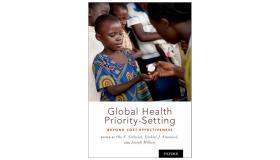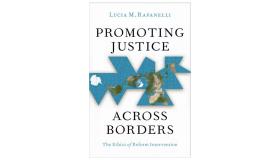
Breadcrumbs navigation
The best books to understand how the global order is changing
This article was originally published by Shepherd, a book discovery website where authors and experts share their favourite books. BISA has a partnership with Shepherd to showcase our members' books and this time it's the turn of James Pattison. Look out for further articles by BISA members in the coming weeks. Try their bookshelf on international relations or politics to browse a wide range of recommended books.
Why am I passionate about this?
I’m a professor in international politics, having written widely on ethical issues in international politics. Much of my previous work has considered the ethical questions that arise when there is a relatively stable, liberal international order, dominated by liberal democracies. But I’m increasingly concerned that, as the global order changes, many of our previous ethical understandings appear anachronistic, with fewer resources to deal with issues, more challenges, and fewer actors willing to act. I’m now trying to better understand what are the implications of rising global authoritarianism and geopolitical shifts mean for states’ global responsibilities and what this means for remaining liberal actors.
I wrote...
Prioritizing Global Responsibilities
By James Pattison and Luke Glanville

What is my book about?
Countries are facing multiple challenges, from climate change to global disease, humanitarian crises to entrenched global poverty. And these are only getting worse as the changing global order and rising global authoritarianism are throwing up new challenges and pressures.
How should they decide which issues to prioritise? Our book tries to answer this question. It considers how states should prioritise as ethically as possible, making the hard decisions to focus on certain areas as justifiable as possible. We argue that states should prioritise issues where they can assist most effectively and where they can help those who are most underprivileged. In practice, we argue, that this means that we should focus most on dealing with global diseases and climate change.
The books I picked & why
Autocracy, Inc.: The Dictators Who Want to Run the World

Why I love this book?
This book really brought home to me the transnational side of rising global authoritarianism.
We know a lot about democratic decline within countries and the changing global order. This book differs as it powerfully documents the transnational links between dictators across the world, working together like never before.
This is even if they are not particularly close or share ideology. Dictators are simply collaborating to enrich themselves by propagating authoritarianism globally and undermining democracy.
It’s also very engagingly written with some powerful vignettes.
Underground Empire: How America Weaponized the World Economy

Why I love this book?
The past few years have seen a massive explosion in the number of sanctions regimes and the use of tariffs as a major foreign policy tool.
This book really helped me to understand what is going on. It documents the "underground empire" developed by the United States in the aftermath of 9/11, drawing on its central role in the financial system, to be able to undertake powerful economic sanctions against both its enemies and allies.
Global Health Priority-Setting

Why I love this book?
This book was really influential in developing how I understand the challenges facing tackling diseases worldwide and theories of prioritisation to deal with them.
The ethics of priority setting is far more developed in the health sphere than in other spheres, stemming from difficult decisions that medical professionals and global health actors have had to make in how to allocate scarce resources.
This book brings together some of the top figures in the field, each with insightful contributions.
Promoting Justice Across Borders: The Ethics of Reform Intervention

Why I love this book?
We often think about intervention as questions of states intervening against other states, violating their legitimate sovereign claims.
This book complicates this picture. It focuses on less violent and risky types of intervention, by a variety of actors, showing how intervention can vary in how much it opposes institutions and how coercive it is.
One example Rafanelli gives is of Tostan (an international NGO that runs community empowerment programs in Western Africa) that works against practices such as female genital cutting and child marriage.
This significantly complicates the simplistic picture of intervention, often proposed by those wanting to reject measures to tackle human rights abuses. Such forms of intervention might be required to help protect democracy globally.
Authoritarian Practices in a Global Age

Why I love this book?
As the world is becoming more autocratic, we often think in terms of "autocracies" and "democracies."
This book helps us to move away from this state-centric approach. It really brought home to me that we should focus on authoritarian practices, where even generally liberal actors can engage in authoritarian practices sometimes.
This helps us to much better understand how the world is changing as it is becoming more autocratic.
Photo by Andrew Stutesman on Unsplash


